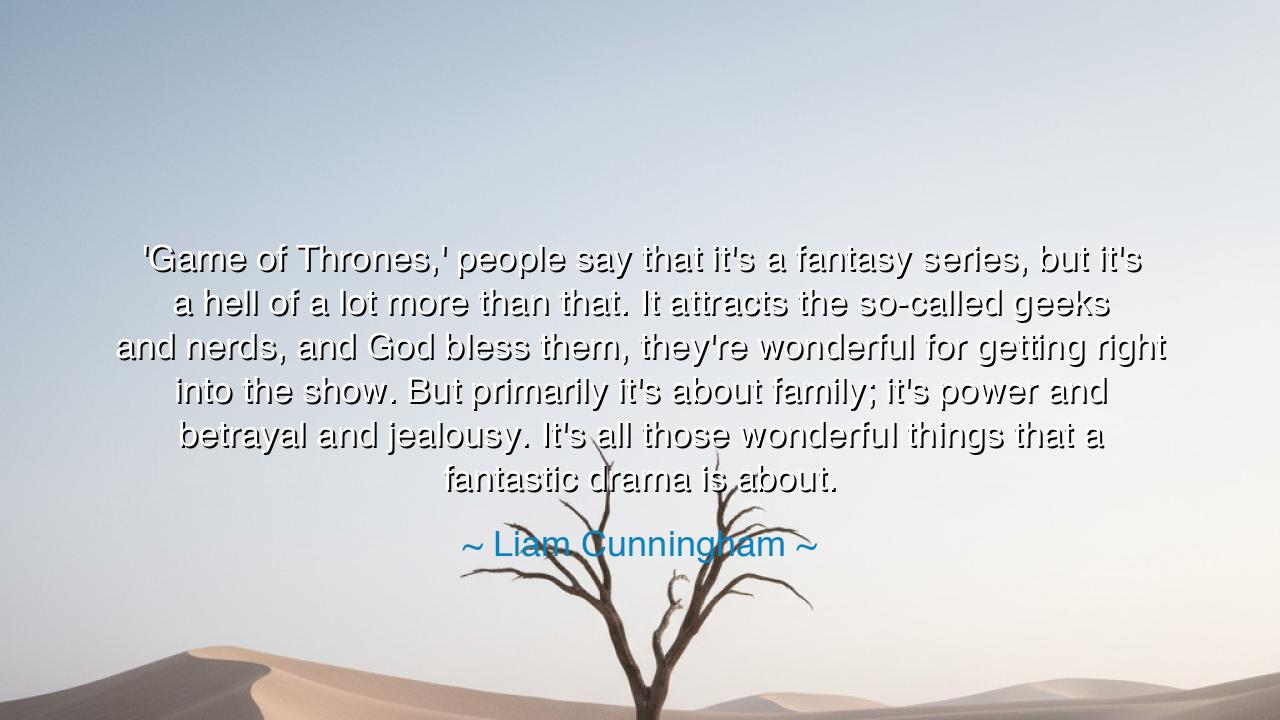
'Game of Thrones,' people say that it's a fantasy series, but
'Game of Thrones,' people say that it's a fantasy series, but it's a hell of a lot more than that. It attracts the so-called geeks and nerds, and God bless them, they're wonderful for getting right into the show. But primarily it's about family; it's power and betrayal and jealousy. It's all those wonderful things that a fantastic drama is about.






“‘Game of Thrones,’ people say that it’s a fantasy series, but it’s a hell of a lot more than that. It attracts the so-called geeks and nerds, and God bless them, they’re wonderful for getting right into the show. But primarily it’s about family; it’s power and betrayal and jealousy. It’s all those wonderful things that a fantastic drama is about.” Thus spoke Liam Cunningham, the actor who breathed life into Ser Davos Seaworth, the Onion Knight, in the tale that captivated millions across the earth. His words strike at the heart of storytelling itself, reminding us that the trappings of swords, dragons, and thrones are but the surface, while beneath lies the eternal struggle of the human spirit.
The meaning of his words is clear: though Game of Thrones wears the garments of fantasy, it is not the magic or the dragons that bind us to it. It is the timeless themes of family, power, betrayal, and jealousy. These are not inventions of fantasy, but realities as old as mankind. A story becomes great not when it dazzles us with spectacle alone, but when it mirrors our own lives, our own struggles, our own desires. Cunningham reveals that at its core, the saga of Westeros is the same as the saga of every household, every kingdom, every age: the endless dance of loyalty and treachery, ambition and downfall, love and loss.
The ancients, too, knew this truth. Homer’s Iliad was not merely about gods and warriors, but about wrath, honor, and betrayal. Sophocles’ tragedies were not simply tales of kings, but explorations of pride, fate, and jealousy. The Norse sagas spoke of dragons and giants, but at their heart were families torn by betrayal and vengeance. So too with Game of Thrones: the fantasy draws us in, but the human drama is what seizes our soul and will not let go.
History itself is filled with tales no less dramatic than those of fiction. Consider the Wars of the Roses, the English conflict of the fifteenth century, where noble houses fought for the throne, where brothers turned against brothers, and where ambition, jealousy, and betrayal tore a kingdom apart. George R.R. Martin drew heavily from such history, but Liam Cunningham’s point is that the fascination lies not in the crowns or castles, but in the raw human truths they reveal. For whether on the battlefield of England or in the halls of Westeros, the passions of men and women remain the same.
And let us not miss the gentleness in Cunningham’s words when he blesses the “geeks and nerds.” He honors those who dive deep into the details, who cherish the world-building and lore. Yet he reminds us that even those who care nothing for dragons or maps of fantasy lands can find themselves enthralled—because beneath the surface, the story belongs to all. When a tale is about love and hate, loyalty and betrayal, it ceases to be fantasy alone; it becomes the mirror of every human heart.
The lesson for us is powerful. Do not dismiss stories, whether they wear the armor of fantasy, the robes of history, or the clothing of modern life. Look deeper. Ask not only what a tale shows on the surface, but what truth it whispers about humanity. For all great dramas—whether on a stage in Athens, in the courts of Shakespeare, or on the screen of our own age—are about the same eternal struggles. To understand them is to understand ourselves.
So let Cunningham’s words be remembered: “It’s about family; it’s power and betrayal and jealousy.” Whether in Westeros or in our own lives, these are the forces that shape destinies. Learn from them. Guard against the poison of jealousy, beware of the snares of betrayal, use power with wisdom, and treasure the bonds of family. For in the end, dragons and thrones may pass away, but the eternal drama of the human heart will remain, written anew in every age. And to see this truth is to step beyond mere fantasy into the timeless realm of wisdom.






AAdministratorAdministrator
Welcome, honored guests. Please leave a comment, we will respond soon